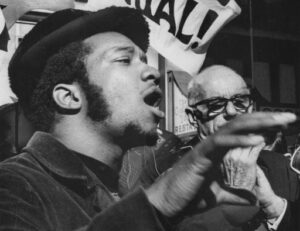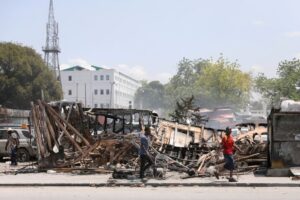The behavior of military forces involved in invasions, wars, and conquering occupations are ostensibly bound by international law. As the watchdog organization Human Rights Watch recently explained,
The laws of war prohibit willful killing, rape and other sexual violence, torture, and inhumane treatment of captured combatants and civilians in custody. Pillage and looting are also prohibited. Anyone who orders or deliberately commits such acts, or aids and abets them, is responsible for war crimes. Commanders of forces who knew or had reason to know about such crimes but did not attempt to stop them or punish those responsible are criminally liable for war crimes as a matter of command responsibility.
Yet conquering armies rarely abide by these constraints, as the Russian invasion of Ukraine is currently demonstrating. U.S. mainstream media hacks document in detail every war crime that Russia is committing in Ukraine, including massacres, executions, and torture—and there are plenty.
But such war crimes are by no means unique to Russia. One need look no further than the U.S.’s “war on terror” in the two decades after 9-11 to discover equally horrific war crimes in Afghanistan and Iraq. But as the world’s largest military superpower, the U.S. has never even been charged, much less convicted, of war crimes by the International Criminal Court in The Hague, Netherlands.
Yet the U.S. admitted that it used phosphorous—a chemical weapon that burns through the skin when ignited—on the Iraqi population when it destroyed Fallujah in the fall of 2004. Revelations of torture in Iraq, Afghanistan and at Guantanamo Bay persisted as the US occupations of Iraq and Afghanistan continued, while the U.S. sent “suspects” to secret prisons in foreign countries to be tortured, a procedure it sanitized with the label “rendition”.
Members of the U.S. Army and the CIA perpetrated physical and sexualabuse, torture, rape, and sodomy of detainees—many in indefinite detention without trial—at the Abu Ghraibprison in Iraq. The Abu Ghraib scandal erupted when CBS news published a series of self-produced photographs of 11 U.S. soldiers,some showing them taunting naked prisoners in sexually humiliating positions.
Guantanamo Bay in Cuba is the U.S.’s longest-standing war prison. Despite promises by presidents Obama and Biden, it remains open to this day. As The Nation recently reported,
Since 2002, 779 Muslim men and boys have been held at Guantánamo, nearly all of them without charge or trial. Today, 39 men remain indefinitely detained there, and 27 of them have never even been charged with any crime. Fourteen of those 27 have been cleared for transfer or release, some for years. Many of the remaining men are torture survivors; the CIA formerly disappeared some of them at “black sites” before our government sent them to Guantánamo.
The only way to fully understand the context of Russia’s current war crimes in Ukraine is to appreciate that they are not unique. The following article first appeared as the editorial, “The Unraveling of the Bush Administration”in the International Socialist Review, March-April 2004.
The Abu Ghraib torture scandal that broke in late April [2004]–barely a year into the U.S. occupation of Iraq–represents a qualitative shift in the scale of the political disaster facing the Bush administration. The images of prison torture and abuse–naked men attacked by dogs and soldiers giving thumbs up signs next to naked men forced into sexual poses (and many more pictures that Congress has decided its members can see but the public cannot)–have made an indelible mark not only on millions of Americans, but on millions throughout the Middle East, and indeed, throughout the world.
The enormous gap between the administration’s rhetoric of liberation and the reality of occupation stands exposed in a way that has permanently damaged the Bush administration, in particular its campaign to use Iraq as a launching pad to remake the entire Middle East region. The whole affair has also left the neocons, who were the chief architects of the administration’s Iraq policy, reeling.
Bush, Rumsfeld, and the military brass are attempting to portray the torture as the work of a small number of soldiers–acting without sanction. The administration has described the soldiers’ actions as “un-American,” and contrary to U.S. policy.
But the photos that have thus far been released, and subsequent revelations, are merely the tip of the iceberg. Indeed, leaked memos written in March 2003 show that Bush had his lawyers prepare analyses arguing that harsh interrogation techniques of detainees were legally permissible, as long as they were not “specifically intended” to cause “severe physical or mental pain and suffering.”
Humiliating, physically abusing, and terrorizing prisoners in order to “soften them up” for interrogation is standard operating procedure for military intelligence, let alone the CIA, which has been exposed in the past for publishing its own terror and torture manuals. Even the army’s own reports–not to mention what has been uncovered by the Red Cross and other independent agencies–reveal that torture is systematic and not confined to Abu Ghraib.
For example, as part of the training of army personnel at Camp Xray in Guantánamo Bay, Specialist Sean Baker was asked to put on an orange jumpsuit and pose as a prisoner. An “internal reaction force” held him down, choked him, and repeatedly slammed his head against the floor, until they noticed that he had an army uniform under the jumpsuit. If this was a training exercise gone wrong, what is the real thing like?
According to Cliff Kindy, a Christian Peacemaker Team worker in Iraq, Iraqis routinely spoke of their relatives being tortured in prison. “We found that about 50 percent of the people spoken with after they were released spoke of some kind of abuse.” The Christian Peacemakers submitted a formal report of their findings last autumn to the U.S. Army, which cited “pretty severe humiliation, lack of access to food and water, people dying with bags over their heads,” and the use of dogs to intimidate prisoners. Prisoners were also denied access to toilets, water, food, and adequate clothing.
The U.S. has a history of committing torture and atrocities against people whom it has attempted to conquer, from the wholesale slaughter of Indians on this continent, to the “water treatment” against Filipino nationalist fighters in the early 1900s, to the systematic torture and assassination of more than 50,000 suspected “Viet Cong” activists and sympathizers under the notorious Phoenix Program during the Vietnam War.
Torture is a necessary part of the apparatus of repression used by conquering powers in order to intimidate and cow a population, and a logical outcome of the racist dehumanizing that always accompanies such wars of conquest. The Bush administration desperately wants to get the occupation back on track. The U.S. hopes that as a result of the UN Security Council’s 15 to 0 vote in support of the new Iraqi government, which it got in exchange for promising Iraqi elections in 2005, it can make the occupation legitimate.
But the UN’s formal endorsement is unlikely to translate into practical support such as contributing troops or sending UN personnel so long as the resistance continues to be widespread. A UN fig leaf isn’t likely to convince Iraqis–who face daily humiliations and violence at the hands of U.S. troops–to accept a new government that the U.S. handpicked with the help of special UN envoy Lakhdar Brahimi.
Thus far, the whole scandal has not gone very far up the chain of command. The Bush administration is desperate to hold the line against the removal of Rumsfeld or anyone too closely connected with Bush, for fear that the whole administration will be implicated.
But it is far from clear that the torture scandal will blow over. As long as the U.S. is unable to stabilize the occupation and the resistance continues to grow, U.S. foreign policy, and the Bush administration along with it, will continue to stagger.
The torture scandal has its roots at the highest levels of the Bush administration. As Seymour Hersh wrote in the May 24 issue of the New Yorker:
The roots of the Abu Ghraib prison scandal lie not in the criminal inclinations of a few Army reservists but in a decision, approved last year by Secretary of Defense Donald Rumsfeld, to expand a highly secret operation, which had been focussed on the hunt for Al Qaeda, to the interrogation of prisoners in Iraq. Rumsfeld¹s decision embittered the American intelligence community, damaged the effectiveness of elite combat units, and hurt America’s prospects in the war on terror.




